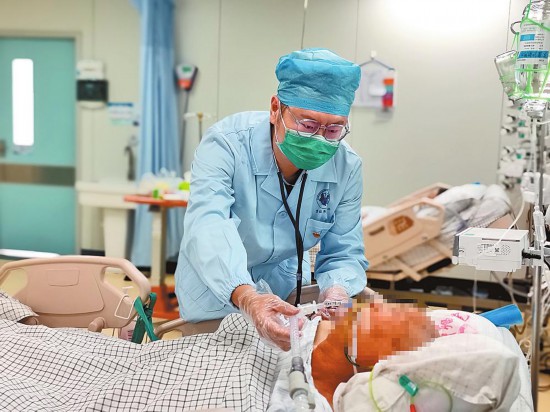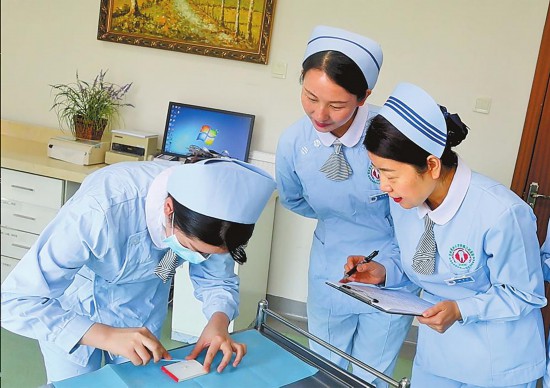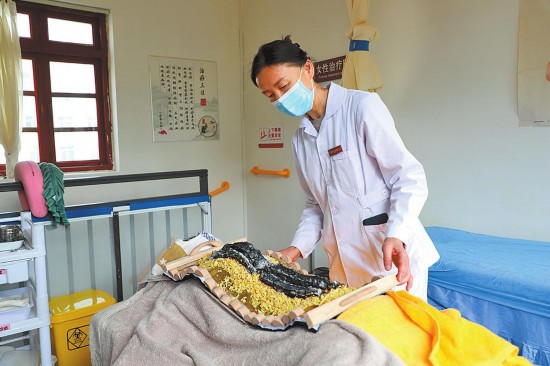Focus on "512" International Nurses’ Day: Protecting Patients with Profession and Care

Cui Xiunan is nursing critically ill patients.

Yao Lan (first from right) checks and evaluates the normal operation skills of hospital nurses.

Yang Qian performed long snake moxibustion for patients in the characteristic Chinese medicine museum. The pictures are all for the picture.
As a backbone of the medical and health system, there are many nursing workers who fight silently and pay selflessly, whether in the daily complicated nursing work in hospitals or when diseases are prevalent and people’s health is threatened.
May 12th this year is the 112th International Nurses’ Day. Our reporter takes you to nurses in different specialties to witness their experiences of caring for patients and life with professionalism and care.
Cui Xiunan, a nurse specializing in critical care medicine: practicing "eighteen martial arts" for patients
"Tracheal intubation, ventilator, circulatory support …" In the Department of Critical Care Medicine of Yunnan Cancer Hospital/the Third Affiliated Hospital of Kunming Medical University, there are often thrilling and life-threatening rescue moments.
Assess the condition, give treatment according to the doctor’s advice, and carry out rehabilitation training … Every medical staff in the Department of Critical Care Medicine needs to practice "eighteen martial arts" to protect the last line of defense of life.
"Ding Rinrin, Ding Rinrin!" At 2 o’clock in the morning of May 10th, the bell rang suddenly in the busy intensive care department, and a patient with respiratory failure needed to be transferred urgently. After the patient was pushed into the department, Cui Xiunan, the nursing team leader of the intensive care department, immediately cooperated with the doctor to give emergency tracheal intubation and carry out invasive ventilator-assisted ventilation.
"Ding Rinrin, Ding Rinrin!" On the other side of the department, the alarm bell of a patient with organ failure rang again. Cui Xiunan had just finished treating the patient with respiratory failure and immediately rushed to the bed to treat the patient with CRRT (continuous hemofiltration and purification) …
"Because of the particularity of intensive care medicine, the patient’s condition often changes rapidly. Different from the regular inspections in general wards, it is necessary for our responsible nurses to pay attention to the changes of patients’ vital signs at any time, basically staying at the patient’s bedside and accurately judging the patient’s situation from the clues of changes in vital signs data. " Throughout the night, Cui Xiunan and his colleagues kept an eye on every patient and were ready to carry out rescue.
From an ordinary nurse to an ICU specialist nurse with comprehensive nursing knowledge and skilled management and rescue techniques for critically ill patients, Cui Xiunan can always appear where patients need it most at the first time. Some patients need to go to the corresponding departments for examination, and they are connected with various instruments and pipelines to maintain their life. Cui Xiunan and his colleagues accompany them all the way; Some patients need to be treated in prone position, but they have almost no mobility. In addition, each patient is connected with various therapeutic instruments and infusion pumps. Cui Xiunan treats the patients in prone position one by one, and then turns them back to their normal positions according to the needs of their illness. In addition to helping patients with daily care such as oral care, facial cleaning and manicure, Cui Xiunan also washes her hair and bathes in bed two or three times a week to keep her body clean. Since 2016, Cui Xiunan has also undertaken clinical teaching work for nursing interns, rotating nurses in hospitals and new nurses.
Over the years, it is with the belief of "life depends on each other and never give up" that Cui Xiunan adheres to the principle of specialized nursing, gives full play to the characteristics and advantages of the department, and adheres to the front line of emergency and critical patients in the hospital.
"With reverence and love for this profession, I will continue to play a role in the nursing post of intensive care medicine and protect the last line of defense of life." Cui Xiunan said.
Yao Lan, a stomatologist’s "right-hand man"
There is such a group of nurses, whose job is not the injection, infusion and medicine distribution as everyone thinks, but more as the assistant of dentists, using the "four-handed operation technology" next to the dental chair, cooperating with doctors to complete each dental treatment efficiently and tacitly, and becoming their "right hand man".
At 18: 30 on May 9, Yao Lan, director of the nursing department of the Stomatological Hospital affiliated to Kunming Medical University, who had just finished a day’s nursing work, stood on the platform of Chenggong Campus of Kunming Medical University to teach the basic theory of stomatology nursing and oral health communication skills to nursing undergraduates.
Connecting shafts has become the normal work of Yao Lan.
In October, 2006, the stomatological hospital affiliated to Kunming Medical University was established, and the stomatological nursing team was established in the same year. At that time, the stomatological nursing in Yunnan was in a blank state. Yao Lan recalled, "At that time, we all changed from nurses in general hospitals to outpatient nurses, and there were still misunderstandings about the concept and post ability of dental specialty nursing."
In the past 17 years, the number of dental specialist nursing team in the hospital has grown to 252, gradually forming a high-level and professional nursing elite, and also pushing the new term "dental specialist nurse" away in the province.
"In addition to skillfully and tacitly cooperating with doctors to complete oral treatment, dental nurses should also put all infection prevention and control measures in place in diagnosis and treatment to ensure the safety of patients and play an important role in the popular science education on the prevention of oral diseases." Yao Lan said that before each treatment, the articles, instruments and equipment needed for diagnosis and treatment should be prepared in advance according to the doctor’s treatment plan.
"Dental nurses should be familiar with the theoretical knowledge of stomatology, master the steps of each oral treatment and the use of professional instruments, and observe the feelings and discomfort of patients." Yao Lan said that in order to better complete these tasks, oral nurses need to work hard.
After taking up the management position, Yao Lan broadened her horizons, shifted her time and energy to improve the overall nursing level of the hospital, and promoted the oral nursing technology in the province to keep pace with the times. In recent years, she led the nursing team to undertake the theoretical and practical teaching of the course of ophthalmology, otorhinolaryngology and stomatology for undergraduates in the School of Nursing of Kunming Medical University. She has successively undertaken more than 10 scientific research projects at all levels, published more than 50 papers, participated in the compilation of the teaching material of Oral Care in higher medical colleges, and edited the Operational Procedures of Practical Oral Nursing, which was published by Yunnan Science and Technology Publishing House in April 2021.
"As a training base for stomatological nurses of the Chinese Stomatological Association, almost all stomatological nurses in Yunnan Province have gone out from the Stomatological Hospital affiliated to Kunming Medical University." Yao Lan said proudly.
Yang Qian, a specialist nurse of traditional Chinese medicine: a "sitting expert" in characteristic nursing clinics.
When you go to the hospital, you usually ask a doctor for advice, but in the First Affiliated Hospital of Yunnan University of Traditional Chinese Medicine/the TCM Characteristic Nursing Clinic of Yunnan Provincial Hospital of Traditional Chinese Medicine, the nurse has become a "sitting expert". They choose the corresponding nursing techniques and nursing methods of traditional Chinese medicine to serve patients through looking, hearing, asking and cutting.
"What’s wrong? How long have symptoms such as difficulty falling asleep and dreaminess occurred? " In the consulting room, Yang Qian, the chief nurse of the TCM characteristic nursing clinic of Yunnan Provincial Hospital of Traditional Chinese Medicine, made an assessment of the patient’s physical condition and made a diagnosis and treatment plan of auricular point sticking and scraping.
"For insomnia, the selection of auricular points mainly includes Shenmen, pillow, kidney, heart and subcortical areas of nervous system." Yang Qian said, "We will differentiate symptoms according to patients’ symptoms, and then stick the medicated seeds with adhesive tape on the corresponding acupoints of patients’ ears to teach patients how to press them, so that they can dredge channels and collaterals, regulate viscera and yin and yang, and thus achieve the effects of improving sleep and relieving anxiety."
Yang Qian said that for some insomnia patients caused by long-term insomnia and diseases with complicated symptoms, they will treat them with auricular point sticking and copper scraping to enhance the curative effect. Scraping with copper cymbals is an operation method combining points (acupoints), lines (meridians) and surfaces (skin of acupoints of viscera and meridians), which can strongly stimulate the qi of viscera and meridians, dredge and regulate the operation of qi-qi, promote the smooth and harmonious operation of qi and blood throughout the body, and promote the body to be in a state of balance of yin and yang, thus achieving therapeutic effect.
In order to open a high-quality clinic with TCM characteristics, since July, 2020, Yang Qian went to Anhui Provincial Hospital of Traditional Chinese Medicine for further study for 3 months, participated in the online study of the first TCM nursing treatment specialist nurse program of Chinese Nursing Association for 2 months, and completed the clinical practice in Guangdong Provincial Hospital of Traditional Chinese Medicine for 1 month, and led 32 nursing backbones of the specialized technical team of the hospital nursing department to improve their professional skills through weekend and spare time study. On July 29, 2021, the hospital’s TCM characteristic nursing clinic was officially opened, and Yang Qian was fully responsible for outpatient management and worked hard to develop outpatient work.
"Carry out five categories of TCM characteristic nursing techniques, such as acupuncture, cupping, moxibustion and massage, and use more than 20 therapies such as auricular point sticking and copper scraping to treat various diseases such as facial features and orthopedics, as well as nursing rehabilitation and health care guidance." Yang Qian said that since the opening of the clinic, she has treated more than 430 patients every month on average and treated more than 24,000 times a year.
In order to better meet the needs of patients, Yang Qian led the team to insist on opening clinics on weekends and tried to carry out night and noon clinics.
During my time as head nurse in Massage Department, I actively studied and practiced advanced nursing management concepts. During her tenure as Deputy Director of Nursing Department, she kept abreast of the new development trend and new management measures of nursing discipline … More than 30 years in spring, summer, autumn and winter, Yang Qian devoted her best years to the nursing of traditional Chinese medicine. Next, she will lead her colleagues to develop TCM nursing clinics in the direction of specialty, special disease and special business skills. (Chen Xinlong)